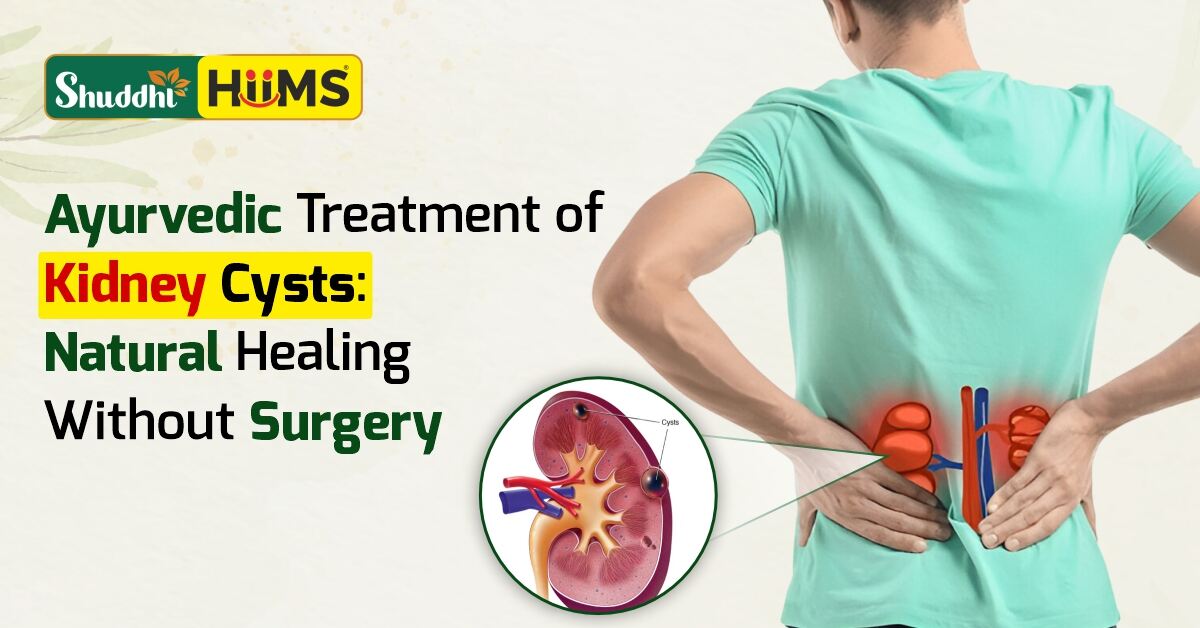Ayurvedic Treatment of Kidney Cysts: Natural Healing Without Surgery

30 Jul, 2025
Ayurvedic Treatment of Kidney Cysts: Natural Healing Without Surgery
Kidney cysts are sacs of water that grow on the surface of the kidneys or inside the kidneys. These cysts are not harmful and do not lead to symptoms. In certain circumstances, they may grow large, become painful, or alter the functioning of your kidneys. The best recommendation in contemporary medicine is to monitor the cysts or consider surgery if they expand or cause harmful issues. But surgery is not the only solution.
Ayurveda has a natural and holistic alternative. Ayurvedic Treatment of Kidney Cysts involves balancing the body, removing toxins, and supporting the kidneys with safe and natural techniques. The HiiMS hospital (a wellness project developed by Jeena Sikho) does not use surgery to treat kidney cysts. It employs non-surgical treatments, such as Panchakarma, the GRAD system, and a DIP-based, vegetable-based diet. These treatments detoxify the body internally. It enhances urine output and increases the body’s natural repair capacity.
Without treatment, kidney cysts are potentially harmful. They can be treated safely and effectively when diagnosed and treated well using Ayurveda. In this blog, we will discuss about the natural treatment of kidney cysts without surgery.
Understanding Kidney Cysts
Typically, kidney cysts are categorised into two types: simple and complex. Simple cysts are more prevalent and generally harmless. They could result in symptoms such as:
- Back or side pain
- Urinating a lot
- Elevated blood pressure
- Urine with blood (in severe situations)
Although the precise cause isn’t always known, Ayurveda believes that imbalanced Tridoshas (Pitta, Kapha, and Vata), decreased Agni (digestive fire), and the buildup of Ama (toxins) are the main causes of cyst formation.
Ayurvedic Treatment of Kidney Cysts
A. Natural Treatment for Kidney Cysts: Using the GRAD System
The GRAD system, employed in HiiMS (Jeena Sikho) hospitals, combines traditional Ayurvedic knowledge with contemporary understanding. By enhancing general circulation and aiding in kidney cleansing, it supports natural treatment for kidney cysts.
1. Therapy with Head-Down Tilt
In this therapy, you lie in a specific position with your legs raised higher than your head. It:
- Increases the kidneys’ blood flow
- Increases the production of urine
- Encourages mild cleansing
It is a non-pharmacological, passive, and efficient way to improve kidney function.
2. Hot Water Immersion Therapy
The patient sits in a heated water tub (around 42°C) during this treatment. From the waist to the shoulders, the water level is progressively raised. This is beneficial:
- Encourage perspiration and the excretion of toxins.
- Increase the flow of blood.
- Calm down your nervous system.
- Encourage the renewal of kidneys.
It is regarded as an effective natural remedy for kidney cysts and other long-term illnesses.
3. DIP Diet for Patients with Kidney Cysts
Food is essential in Ayurveda for kidney health. The DIP Diet (Disciplined and Intelligent Person’s Diet) at HiiMS (Jeena Sikho) consists entirely of natural, plant-based, and easily digestible foods to reduce the strain on the kidneys. This diet promotes the body’s natural detoxification process and lowers inflammation.
Morning, from 7:00 to 9:00
Plate 1: Seasonal, fresh fruits; 10 grams per kilogram of body weight
Plate 2: A meal prepared at home or made with millet, such as idli, poha, upma, etc.
In the afternoon, from 1:00 to 2:00
Plate 1: Three to five types of raw vegetable salad; quantity: 5 grams per kilogram of body weight
Plate 2: A light, freshly prepared Indian dish like dhokla, roti with sabzi, daliya, or khichdi.
At Night (Before Sunset)
Eat just fruits and raw salad (10g per kg body weight) if you’re missing dinner.
When eating a light meal:
Plate 1: Raw salad and fruits (5g/kg body weight)
Plate 2: Light dishes like boiled vegetables or vegetable soup
Important Points to Remember:
There is no interval of time between Plates 1 and 2. Eat each one in turn.
This technique enhances digestion and prevents intestinal fermentation, which is crucial for treating kidney cysts.
Diet for kidney cyst patients, this strict eating regimen is not only easy to follow but also practical, as it promotes cleansing, reduces swelling, and supports the kidneys’ natural recovery process.
Why Opt for Ayurvedic Treatment for Kidney Health?
- Non-surgical: Avoid invasive procedures.
- Herbal remedies and formulations have no negative effects.
- Healing from the core: Addresses imbalance rather than symptoms
- Holistic approach: Consists of lifestyle modification, detoxification, and diet
By choosing Ayurveda for kidney health, you are enabling your body to use natural means to repair, revitalise, and preserve equilibrium.
Conclusion
Ayurvedic treatment of kidney cysts offers a holistic, safe, and natural path to recovery without any surgery and side effects. Ayurveda addresses not just the symptoms, but also the root cause of kidney cysts, by emphasising body detoxification, balancing doshas, and following a supportive diet. HiiMS (Jeena Sikho) offers therapies, including Panchakarma, the GRAD system, and a diet tailored for kidney cyst patients and those seeking long-term kidney health. Ayurveda offers a well-established, soothing, and effective remedy for kidney cysts, providing a natural solution. Put your faith in Ayurveda for kidney health, restore balance, and help in your body’s inherent healing process. Enter a life of well-being by selecting kidney cyst treatment in Ayurveda.
FAQs
Q1.Is it possible to treat kidney cysts with Ayurveda without surgery?
Ayurvedic treatments can be used to naturally treat minor kidney cysts.
Q2.What is the ideal diet for those with kidney cysts?
Kidney detox is supported by a plant-based DIP diet that includes fruits, salads, and light meals.
Q3.Can kidney cysts be treated with Panchakarma?
Panchakarma balances doshas associated with renal diseases and eliminates toxins.
Q4.Do Ayurvedic kidney therapies have any adverse effects?
Ayurvedic kidney therapies are generally considered safe and natural, mainly when used under the guidance of a qualified Ayurvedic practitioner.
Q5.How does Ayurveda enhance kidney health?
Through food, dosha balance, and detoxification, Ayurveda improves kidney function.






3 comments
SONALI MAITY
Name: SONALI MAITY Phone: 8293330780 Disease: NEPHROTICSYNDROME Comment: HAVE ANY TREATMENT
SONALI MAITY
Name: SONALI MAITY Phone: 8293330780 Disease: NEPHROTICSYNDROME Comment: HAVE ANY TREATMENT